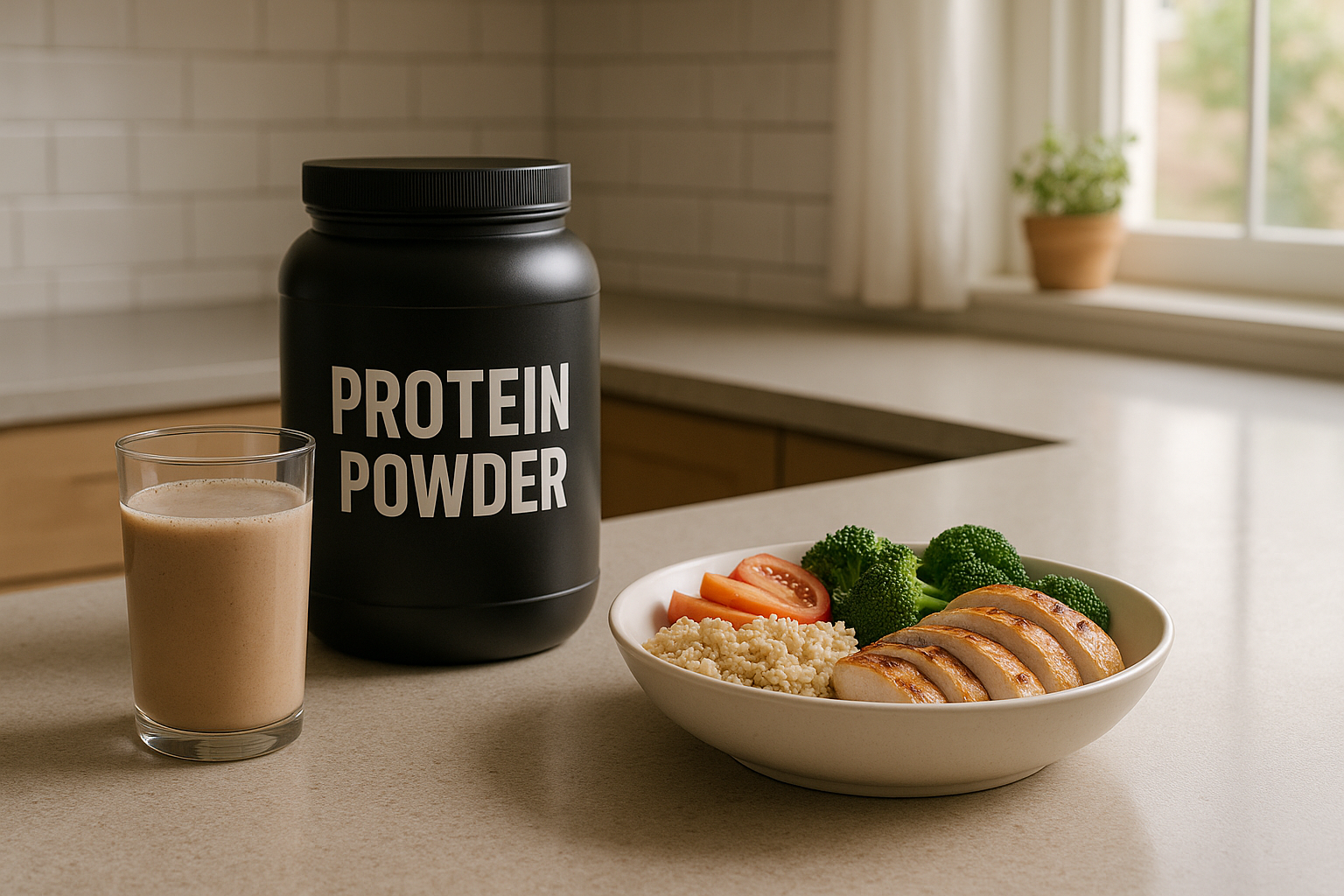
Ultimate Guide to Nighttime Supplement Timing
What are Nighttime Supplements?
Nighttime supplements can boost recovery, improve sleep, and enhance nutrient absorption by aligning with your body's natural rhythms during sleep. Here’s what you need to know:
- Who Benefits Most: Athletes for muscle recovery, sleep-challenged adults for better rest, shift workers for improved daytime sleep, and older adults for recovery and sleep maintenance.
-
Best Nighttime Supplements:
- Melatonin: Take 30-60 mins before bed for sleep onset.
- Magnesium Glycinate: 200-400 mg, 1-2 hours before bed for relaxation.
- Glycine: 3 g before bed to regulate body temperature and enhance sleep quality.
- Timing Tips: Match supplement timing to your body’s recovery cycles. For example, magnesium works best in the evening, while energizing vitamins like B-complex should be taken in the morning.
- Common Mistakes to Avoid: Avoid taking energizing supplements like Vitamin D or B12 at night, and space calcium and magnesium supplements by 2 hours to prevent absorption issues.
Use this guide to build a personalized nighttime supplement routine that supports your health and recovery goals.
Best Supplements for Improving Sleep
Body Rhythms and Supplement Absorption
Your body's internal clock plays a big role in how supplements are processed and absorbed. These natural rhythms are closely tied to nighttime recovery, making it possible to fine-tune your supplement routine for better results.
How Daily Cycles Affect Metabolism
Your metabolism follows a 24-hour cycle, influencing how nutrients are handled at different times. At night, several changes take place:
- Insulin sensitivity drops in the evening, which impacts how glucose is managed [1].
- Digestive activity slows down, with reduced enzyme production and longer gastric emptying times.
- Growth hormone levels increase during deep sleep, aiding in tissue repair.
Since the body's metabolic rate naturally slows down at night, the way supplements are absorbed and used also shifts.
| Factor | Daytime | Nighttime |
|---|---|---|
| Insulin Sensitivity | High | Low |
| Nutrient Priority | Energy production | Tissue repair |
Best Times for Different Nutrients
The timing of when you take supplements can make a big difference. Here’s how to match nutrients to your body’s needs:
Fat-Soluble Vitamins (A, D, E, K):
- Take these with an evening meal that includes healthy fats to work with slower digestion.
- Vitamin D absorbs 50% better when paired with your largest meal of the day.
Water-Soluble Supplements:
- These are best on an empty stomach.
- For example, iron absorbs 6.6% better in the morning compared to the evening.
- B-vitamins are ideal for morning use since they can boost energy levels.
Nighttime-Focused Options:
- Magnesium is particularly helpful in the evening, promoting relaxation and better sleep.
Research shows that supplement timing can significantly impact their effectiveness. Women may benefit from syncing their intake with menstrual cycle phases, while older adults might consider taking supplements earlier in the evening due to slower absorption rates.
Best Supplements to Take at Night
Taking supplements that align with your body's nighttime recovery can enhance their effectiveness.
Melatonin for Sleep
Melatonin is a popular choice for those struggling with sleep. The key to using it effectively lies in timing and dosage. Start with a low dose of 0.5-1 mg about 30-60 minutes before bed. This method works in harmony with your body's natural melatonin production cycle.
| Melatonin Timing | Timing | Best For |
|---|---|---|
| Starter Dose (0.5-1 mg) | 30-60 mins before bed | First-time users |
| Standard Dose (2-3 mg) | 1-2 hours before bed | Regular users |
| Maximum Dose (5 mg) | 2 hours before bed | Chronic insomnia |
Magnesium Types and Uses
Magnesium comes in various forms, each offering unique benefits. For nighttime use, magnesium glycinate is a standout for improving sleep, while other forms target different needs.
| Magnesium Form | Primary Benefit | Recommended Dosage |
|---|---|---|
| Glycinate | Sleep quality & absorption | 200-400 mg |
| Threonate | Brain function & sleep | 100-300 mg |
| Citrate | Muscle relaxation | 200-350 mg |
To get the most out of magnesium, take it 1-2 hours before bed. Pairing magnesium with glycine can further enhance its sleep-supporting effects.
Glycine's Sleep Benefits
Glycine helps regulate your body temperature, which is crucial for better sleep. A standard dose of 3 grams before bed can improve sleep quality significantly.
Key benefits of glycine include:
- Temperature regulation: Helps lower your core body temperature
- Improved sleep quality: Shortens the time it takes to fall asleep
- Increased morning alertness: Boosts daytime performance
Sleep-Supporting Herbs
Certain natural herbs are known for their calming properties, helping you ease into sleep. Here are some of the most effective options:
| Herb | Dosage | Timing | Primary Benefit |
|---|---|---|---|
| Valerian Root | 300-600 mg | 30-60 mins before bed | Sleep onset |
| Passionflower | 500 mg | 1 hour before bed | Anxiety reduction |
| Ashwagandha | 300-600 mg | Evening | Stress management |
For consistent results, stick with one herb for 2-4 weeks. These gentle remedies can be a great addition to your nightly routine.
sbb-itb-7567710
How to Combine Night Supplements
By aligning supplement choices with your body's natural nighttime rhythms (discussed in the Body Rhythms section), you can maximize their benefits.
Day and Night Supplement Plans
To get the most out of your nighttime recovery, focus on supplements that help with sleep, relaxation, and recovery. Here's a suggested evening stack:
Nighttime Stack (Take 1-2 hours before bed):
- Magnesium glycinate: 200-400 mg
- Melatonin: 0.5-3 mg
- Glycine: 3 g
Timing and Spacing for Best Results
Proper spacing ensures supplements don't interfere with each other and allows them to work together effectively.
Suggested Nighttime Combinations:
| Combination | Benefits | Timing |
|---|---|---|
| Magnesium + Melatonin | Promotes better sleep | 1 hour before bed |
| Glycine + Magnesium | Encourages relaxation | 1-2 hours before bed |
| Magnesium + Zinc + B6 | Aids muscle recovery | With evening meal |
Spacing Tips:
- Keep calcium and magnesium supplements at least 2 hours apart, as they compete for absorption.
5 Common Night Supplement Mistakes
While combining supplements can improve results (as covered earlier), it's just as important to steer clear of these frequent missteps:
Wrong Timing of Supplements
Taking energizing supplements too close to bedtime is a common mistake. Vitamin D and B-complex vitamins are known culprits. For instance, vitamin D might reduce melatonin levels, which can disrupt sleep.
Here’s how to fix timing issues:
- Take vitamin D before 2 PM to align with natural absorption patterns.
- Use energizing supplements in the morning.
- Leave a gap of 1-2 hours between your last supplement and bedtime.
Too Many B-Vitamins at Night
Overloading on B-vitamins in the evening can interfere with sleep. Here’s a quick guide to timing them properly:
| B-Vitamin Type | Effect on Sleep | Best Time to Take |
|---|---|---|
| B6 | Increases energy and metabolism | Before 2 PM |
| B12 | Boosts energy | Morning only |
| B-Complex | Supports metabolism | With breakfast |
Supplement and Medicine Conflicts
Some supplements can interact with medications, especially when taken at night. These interactions can cause unexpected side effects or reduce the effectiveness of either the supplement or the medication.
Examples of Nighttime Interactions:
- Melatonin may interfere with blood thinners and diabetes medications.
- Magnesium can hinder the absorption of some antibiotics.
To stay safe:
- Keep a 2-hour gap between supplements and medications.
- Maintain a log of what you’re taking and review it with your healthcare provider regularly.
Choosing Quality Night Supplements
Picking the right nighttime supplements means paying attention to a few important details. For nighttime formulas, it’s especially important to focus on how well they’re absorbed and how they support restful sleep.
What to Look for in a Night Supplement
When assessing nighttime supplements, keep an eye out for these key factors:
Third-Party Testing and Certifications
Choose products that have been independently verified. For example, look for certifications like:
- Informed-Choice certification
Ingredient Quality and Transparency
A solid nighttime supplement should provide clear details, such as:
- Exact amounts of active ingredients in forms optimized for nighttime use
- Information about potential allergens
| Quality Indicator | What to Look For |
|---|---|
| Manufacturing Standards | GMP certification |
| Ingredient Disclosure | Full ingredient list with precise amounts |
| Testing Documentation | Third-party lab results |
| Bioavailability | Night-friendly forms like magnesium glycinate |
NutriFitt: Night Supplement Options

NutriFitt offers nighttime supplements designed with these considerations in mind. Here's what sets their products apart:
Key Ingredients
NutriFitt’s formulas include night-optimized nutrients, such as:
- Magnesium glycinate (200-400mg): Known to support better sleep quality (as explained in the Magnesium section)
- L-theanine (200-400mg): Helps promote relaxation
Safety and Guidance
NutriFitt ensures that their products are safe and easy to use by offering:
- Clear usage instructions
- Warnings about potential interactions with medications
- Customer support for personalized questions or concerns
Always follow the dosage recommendations and consult your healthcare provider if you’re taking other medications.
Conclusion: Building Your Night Supplement Plan
Main Points to Remember
Effective nighttime supplementation comes down to understanding your body's needs and timing. Align your supplement choices with your natural recovery cycles (as explained in the Body Rhythms section) to get the most out of them. For example, pairing magnesium with melatonin may help improve sleep quality due to their complementary effects.
"Consistency in timing establishes effectiveness - allow 2-4 weeks for results while maintaining schedule"
How to Start
Here’s how you can put these strategies into action:
- Start with magnesium glycinate or citrate, taking it at the same time each night.
- Monitor your sleep patterns for 30 days to notice any changes.
- Adjust the timing and dosage based on how your body responds over 2-4 weeks.
It’s important to talk to your healthcare provider before introducing any new supplements, especially to avoid potential interactions (as mentioned in the Supplement and Medicine Conflicts section). Start with high-quality, single-ingredient supplements, and take the time to track your results before making adjustments.
FAQs on Nightime Supplements
How long does it take for nighttime supplements to work?
Nighttime supplements typically take 2–4 weeks of consistent use to deliver noticeable results. While some, like melatonin, can work within 30–60 minutes by promoting sleep onset, others—such as magnesium or glycine—support long-term improvements in sleep quality, relaxation, and recovery. These nutrients work best when taken at the same time each night, allowing your body to adjust to a consistent rhythm. Sleep-supporting herbs like valerian or ashwagandha may also need several weeks of use to take full effect, especially when managing chronic stress or anxiety. It’s important not to judge effectiveness too early—short-term variability in sleep can mask improvements. Track your sleep duration, quality, and how refreshed you feel in the morning over a 30-day period. If you're not seeing benefits after a few weeks, consider adjusting dosage or timing, or consult a healthcare provider. Consistency is key—results improve as your body learns to sync with your supplement routine.
Why should you avoid certain supplements like Vitamin D or B12 at night?
Some supplements—like Vitamin D, B12, and B-complex—can interfere with sleep when taken too late in the day. These nutrients have energizing effects that stimulate metabolism and promote wakefulness, which is helpful in the morning but disruptive at night. For instance, Vitamin D may suppress melatonin, the hormone responsible for sleep onset. B-vitamins, particularly B6 and B12, enhance energy production and cognitive function, which can make falling asleep more difficult if taken close to bedtime. To avoid these issues, it’s best to take energizing vitamins before 2 PM, ideally with breakfast or lunch. Timing your supplements to match your body’s natural energy and rest cycles ensures they support rather than disrupt sleep. In contrast, calming nutrients like magnesium, glycine, and melatonin should be reserved for evening use. This simple timing adjustment helps optimize both energy during the day and relaxation at night—supporting more restful sleep and better overall recovery.
What are the best supplements to take at night for better sleep and recovery?
The best nighttime supplements are those that align with your body’s natural recovery processes. Melatonin (0.5–3 mg) helps with sleep onset and is most effective when taken 30–60 minutes before bed. Magnesium glycinate (200–400 mg) promotes relaxation and improves sleep quality, especially when taken 1–2 hours before bedtime. Glycine (3 g) helps regulate body temperature and enhances sleep depth and morning alertness. These supplements support the body’s nighttime focus on tissue repair and hormonal regulation. Herbal options like valerian root, passionflower, and ashwagandha also help reduce stress and ease the transition to sleep. When combining supplements, ensure proper spacing—like taking calcium and magnesium two hours apart to avoid absorption conflicts. This targeted approach helps improve sleep quality and boosts overnight recovery. For best results, follow a consistent routine over 2–4 weeks and consult a healthcare provider, especially if you’re on medications that may interact with sleep-supporting nutrients.



















